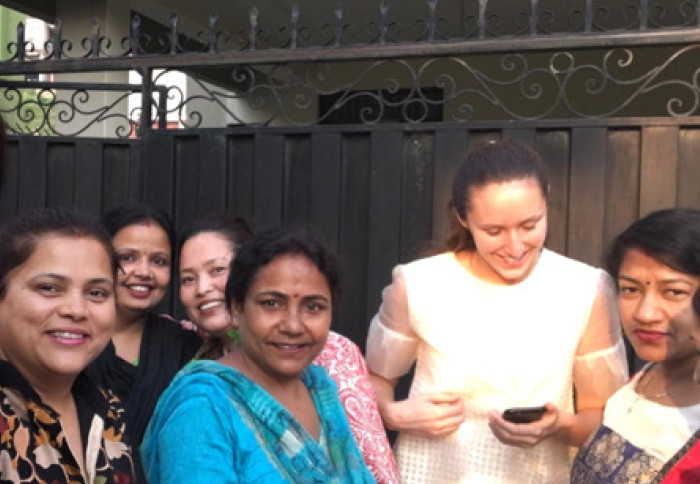Mobile App Tests Water Safety in Nepal

Empowering citizens: a mobile app is helping citizens in Kathmandu to encourage a change in the management of their water supply.
The water distribution system of Kathmandu, Nepal, has struggled to keep up with the high urban population growth - and as a result, people only receive piped water for a few hours every few days, or sometimes every few weeks.

Aiming to improve Kathmandu Valley’s water distribution network while empowering residents, Laure Sioné, a PhD student in the EPSRC-funded CDT for Sustainable Civil Engineering in the Department of Civil and Environmental Engineering has looked to citizen science to generate much-needed data.
Laure said, “The water from the municipality is supposed to be reliable and potable, but sometimes it can be tinged yellow or heavily contaminated with bacteria due to broken pipes”.
Residents rarely receive enough water to fulfil their needs, and they resort to installing tanks, digging their own wells, and buying bottled water to drink.
Residents often complain to the water utility company (KUKL), but lack of a proper monitoring system hinders even the best remediation efforts.
Testing the waters
With residents in even the poorest parts of the world now owning mobile phones, Laure decided to create the Networking Water (NW Data) mobile app for people to record the timeliness, quantity, and quality of their water supply in Kathmandu.
The aim was for the data to be used by:
- Kathmandu Valley’s water utility, to monitor the water distribution and take action as needed.
- Development partners and funders, to better evaluate the impact of their investments.
- Residents, to be involved in improving their water situation.
We have had very positive feedback... People have enjoyed learning about their water Laure Sioné
Ms Sioné travelled to Kathmandu in 2019 and recruited over a hundred residents to participate in the research initiative. She and her supervisor, Professor Michael Templeton, conducted community meetings in which participants were taught how to use the app as well as simple water-quality test kits that could be used at home.
Participants send photos of the results of the water quality test to the Networking Water Facebook page and receive personalised feedback on the results, including recommendations on what actions they should take to use the water safely.
“We have had very positive feedback from the participating residents in Nepal. People have enjoyed learning about their water, the empowerment that comes with being able to follow up their claims to the water utility company and interacting with scientists who are working with them for a change,” said Ms Sioné.
Expansion in Nepal
Another aspect of Ms Sioné’s work in Nepal was to consult with policy makers to ensure the data would be well-received if the app was implemented at a larger scale. To that end, she met with officials from the water utility company, and prominent figures such as Mr Bhim Upadhyaya, previously Minister for Water and Environment.

The project is therefore a joint social science, engineering and computing venture.
“Since I can only claim to be an expert in engineering, I decided to collaborate with colleagues from other relevant disciplines to make sure that the project would be a success” said Ms Sioné.
The research is in collaboration with the National University of Singapore. Dr Olivia Jensen from the Institute for the Public Understanding of Risk was approached for her expert knowledge on policy. Other collaborators include Imperial College’s Dr Christian Onof and Stephane Bressan from NUS’s School of Computing, who helped to analyse the generated data.
Positive impacts
The water utility company KUKL has since launched two similar mobile applications, with the objective of “accessing information, easing distribution, and collecting complaints from service-recipients*”.
Mr Gyanendra Bahadur Karki, Act. Deputy Executive Officer for the Planning and Support Department at KUKL, confirmed that Imperial College’s research contributed to these apps.
Article text (excluding photos or graphics) © Imperial College London.
Photos and graphics subject to third party copyright used with permission or © Imperial College London.
Reporter
Melanie Hargreaves
Department of Civil and Environmental Engineering